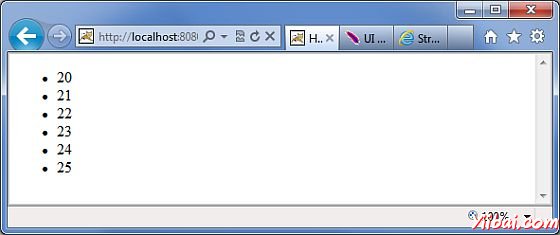Struts2 param 標籤
param標籤可用於引數其他標籤。包括標籤和bean標籤,這種標籤的例子。讓我們以同樣的例子我們已經討論,同時討論bean標籤。
建立動作類:
package com.yiibai.struts2; public class HelloWorldAction{ private String name; public String execute() throws Exception { return "success"; } public String getName() { return name; } public void setName(String name) { this.name = name; } }
建立檢視
讓我們看看包含以下內容的helloWorld.jsp:
<%@ page contentType="text/html; charset=UTF-8" %> <%@ taglib prefix="s" uri="/struts-tags" %> <html> <head> <title>Hello World</title> </head> <body> <s:bean name="org.apache.struts2.util.Counter" var="counter"> <s:param name="first" value="20"/> <s:param name="last" value="25" /> </s:bean> <ul> <s:iterator value="#counter"> <li><s:property /></li> </s:iterator> </ul> </body> </html>
接下來讓我們看看employees.jsp包含以下內容:
<%@ page contentType="text/html; charset=UTF-8"%> <%@ taglib prefix="s" uri="/struts-tags"%> <html> <head> <title>Employees</title> </head> <body> <p>An example of the include tag: </p> <s:include value="HelloWorld.jsp"/> </body> </html>
組態檔案
struts.xml中應該像這樣:
<?xml version="1.0" encoding="UTF-8"?> <!DOCTYPE struts PUBLIC "-//Apache Software Foundation//DTD Struts Configuration 2.0//EN" "http://struts.apache.org/dtds/struts-2.0.dtd"> <struts> <constant name="struts.devMode" value="true" /> <package name="helloworld" extends="struts-default"> <action name="hello" class="com.yiibai.struts2.HelloWorldAction" method="execute"> <result name="success">/HelloWorld.jsp</result> </action> <action name="employee" class="com.yiibai.struts2.Employee" method="execute"> <result name="success">/employee.jsp</result> </action> </package> </struts>
web.xml 應該像這樣:
<?xml version="1.0" encoding="UTF-8"?> <web-app xmlns:xsi="http://www.w3.org/2001/XMLSchema-instance" xmlns="http://java.sun.com/xml/ns/javaee" xmlns:web="http://java.sun.com/xml/ns/javaee/web-app_2_5.xsd" xsi:schemaLocation="http://java.sun.com/xml/ns/javaee http://java.sun.com/xml/ns/javaee/web-app_3_0.xsd" id="WebApp_ID" version="3.0"> <display-name>Struts 2</display-name> <welcome-file-list> <welcome-file>index.jsp</welcome-file> </welcome-file-list> <filter> <filter-name>struts2</filter-name> <filter-class> org.apache.struts2.dispatcher.FilterDispatcher </filter-class> </filter> <filter-mapping> <filter-name>struts2</filter-name> <url-pattern>/*</url-pattern> </filter-mapping> </web-app>
右鍵點選專案名稱,並單擊“匯出”>WAR檔案建立一個WAR檔案。然後部署此WAR在Tomcat的webapps目錄下。最後,啟動Tomcat伺服器和嘗試存取URL http://localhost:8080/HelloWorldStruts2/hello.action。這會給出以下畫面:

在這個例子中,我們範例化一個新的org.apache.struts2.util.Counter bean的範例。然後我們的第一個屬性設定為20和25的最後一個屬性。這意味著計數器的值分別為20,21,22,23,24和25。我們給一個名為“counter”的bean。 struts的bean標籤bean的範例化,並把它值棧中的。現在我們可以使用疊代器去,通過計數器bean的nd列印出計數器的值。